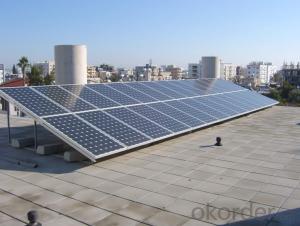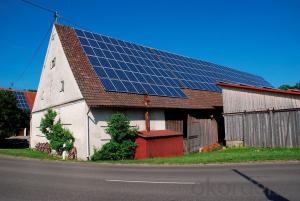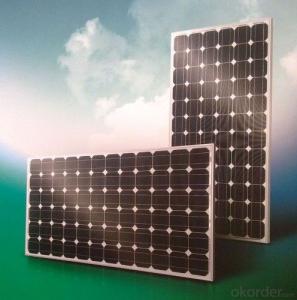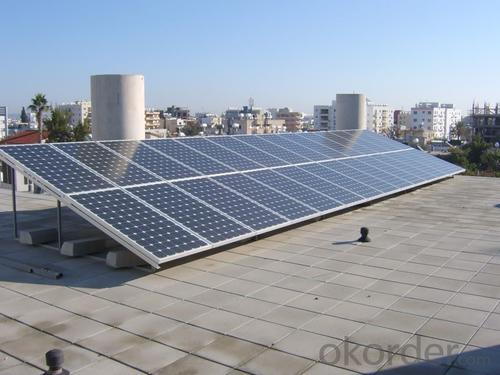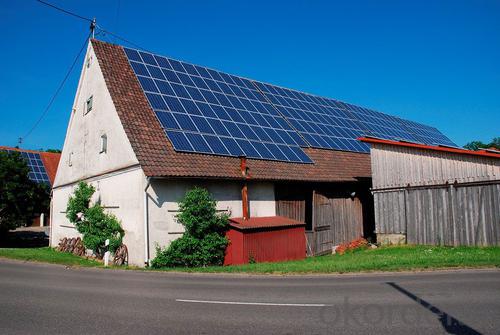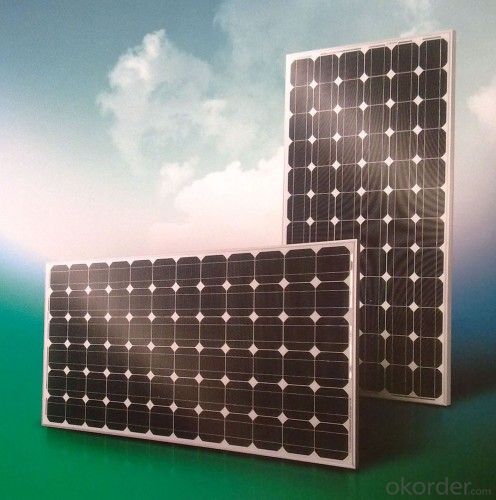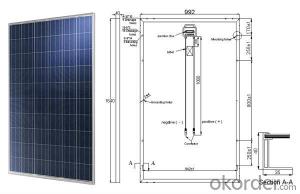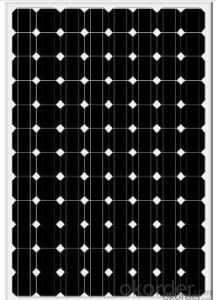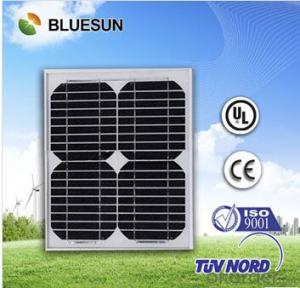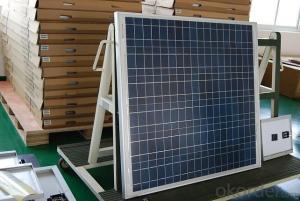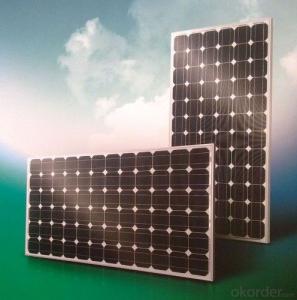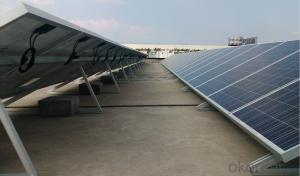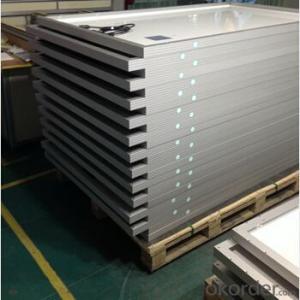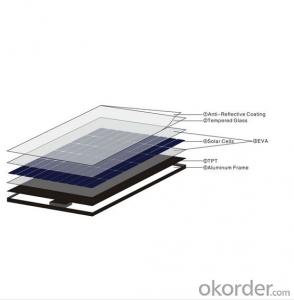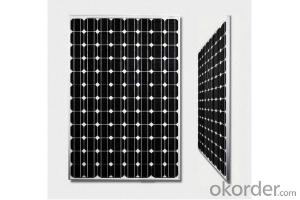Suitcase Solar Panels - CNBM Solar Monocrystalline 156 Series (40W)
- Loading Port:
- China main port
- Payment Terms:
- TT OR LC
- Min Order Qty:
- 100000 watt
- Supply Capability:
- 10000000 watt/month
OKorder Service Pledge
OKorder Financial Service
You Might Also Like
About us
CNBM International Corp, established in 2004, is the business entity for trade and logistic of CNBM Group.With the advantages in Cement, Composite Materials, New Building Materials and Engineering, CNBM mainly concentrate on coal, steel and construction equipments and give priority to solar and wind energy development.CNBM International is highly recognized by its business partners and clients all over the world and has established good business relationship with the customers in over 120 countries and regions all over the world.
Work Principle
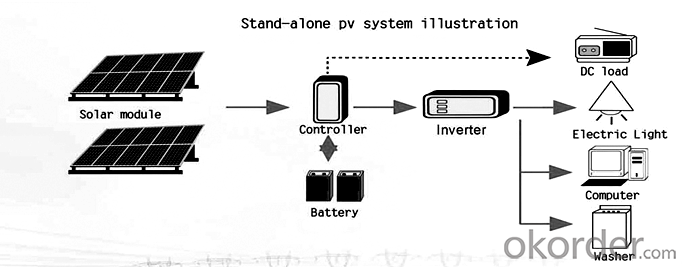
Data sheet
| Characteristics | |
| Max Power Voltage Vmp (V) | 17.2V |
| Max Power Current Imp (A) | 2.33A |
| Open Circuit Voltage Voc (V) | 22.2V |
| Short Circuit Current Isc (A) | 2.48A |
| Max Power Pm (W) | 40W |
| Temperature Coefficient of Cells | |
| NOCT | 47℃±2℃ |
| Temperature Coefficients of Isc (%/℃) | 0.06% |
| Temperature Coefficients of Voc (%/℃) | -0.32% |
| Temperature Coefficients of Pmp (%/℃) | -0.45% |
| Mechanical Data | |
| Type of Cells (mm) | Mono156×44.6 |
| Dimension | 610×510×25mm |
| Weight | 3.7kg |
| NO.of Cells and Connections | 3×12=36 |
| Limits | |
| Operating Temperature | –45°C to +80°C |
| Storage Temperature | –45°C to +80°C |
| Max System Voltage | 700V |
Guarantee
Products Guarantee 2 yrs free from defects in materials and workmanship
Performance Guarantee No less than 90% within 10yrs and no less than 80% within 20yrs Certificates IEC, ISO, CE
FAQ:
Q1: Why buy Materials & Equipment from OKorder.com?
A: All products offered byOKorder.com are carefully selected from China's most reliable manufacturing enterprises. Through its ISO certifications, OKorder.com adheres to the highest standards and a commitment to supply chain safety and customer satisfaction.
Q2: What is a solar PV module?
A: A solar PV module consists of many solar cells that are connected together (typically in series) and packaged in a frame (typically made of aluminum).
Q3: What are the advantages and disadvantages of monocrystalline solar PV modules?
A: Monocrystalline solar PV modules are the most efficient type of solar PV modules, with the exception of CdTe thin film solar PV modules. As a result, monocrystalline solar PV modules are more expensive when compared to almost all other types of solar PV modules.
- Q: If we invest billions in green energy and put up thousands of square miles of black panels that give off radiant heat couldn't that significantly cause more warming, not to mention the energy required to even make them?
- Claire's argument doesn't make much sense to me either. First; Claire is talking about the second law ('you can only lose or break even'), not the third law ('you can't get to absolute zero'). Easily confused, but not that important! Putting a solar panel down _can_ increase the heat absorbed by Earth. Everything has an 'albedo' (the proportion of incoming light it reflects), and Earth's average albedo is about 0.3 (ie 30% of incoming light is reflected, most of which leaves the atmosphere straight away). By putting a 0.05 albedo solar panel down on a 0.3 albedo surface, you increase the amount of sunlight that is absorbed by Earth and therefore contribute to warming. This heat is re-radiated at the Earth's temperature, in the right wavelength range to be absorbed by greenhouse gases too. If you put a panel down on equatorial ocean, or a black roof, however, there is pretty much no effect (since the albedo change is small). Also, the heating effect only lasts as long as the panel is there. Most panels are estimated to last 50 years, meanwhile CO2 has a mean lifetime of 00+ years. I did some maths and found that the 00 year averaged change in radiative forcing for solar panels was negative compared to the UK electric grid, because the reduction in CO2 emissions has a larger effect than the change in albedo. If I have spare time tomorrow I'll redo the calculations and share them. The albedo change has to be considered though!
- Q: Can solar panels be installed on a south-facing wall?
- Yes, solar panels can be installed on a south-facing wall. In fact, a south-facing wall is often the most ideal location for solar panel installation as it receives the most sunlight throughout the day.
- Q: Solar panels are costly.Do you know any inexpensive way?So that i can make one of my own.
- There are a couple other methods under development. One uses a fan inside a cooling tower and a large area covered with black tarps. The heated air can only escape through the cooling tower in the center of the site. The air movement turns the fan blades that spin a generator. Another solar generator uses mirrors that track the sun and focus their energy on a large pipe. I don't recall the contents of the pipe, but the superheated material is used to boil water generating steam to spin a turbine/generator. Neither of these are small scale projects, and are probably far more expensive than what you're looking for.
- Q: What is the average lifespan of a solar panel?
- The average lifespan of a solar panel is typically around 25 to 30 years.
- Q: I've run out of things to keep me entertained recently and as part of a larger project, I was curious if its possible to 'McGuyver' up a solar panel out of common materials?
- It okorder /
- Q: How about using Solar Panals to provide the electrical power to separate the H2 from the O? H2 would be fed into the engines carburator like a gas/air mixture ratio, but H2/air mixture ratio instead. How would you control the exact measurements?
- Currently solar panels are rated at about 5 percent efficiency. That means that about 85 percent of the solar energy that is falling on it, is wasted. Electrolysis is also about 67 percent efficient. So the TOTAL amount of solar energy you would have converted into hydrogen is 67 percent of 5 percent. Using my calculator that comes out to: about 0 percent total efficiency. About 90 percent of your solar energy gets wasted in the process. A better alternative to solar panels would be solar powered sterling generators. Sterling engines are EXTERNAL COMBUSTION engines, like the old fashioned steam engine, and can be run off any heat source - including the sun. Heat from the sun is focused using parabolic mirrors, and the efficiency of a sterling engine / generator combination is rated at about 30 percent. Your TOTAL efficiency - both solar sterling and electrolysis combined - would be around 20 percent. If you are dead set on using hydrogen? Even though there are better alternatives? Such as alcohol? Then I would suggest storing it in titanium dioxide pellets. This way you can store the hydrogen, without it being in danger of exploding. You can ALSO ram a hydrogen container like this into a solid brick wall. Once again? Without fear of an explosion. Numerous studies have been conducted on this. As for controlling the exact measurements? Nothing in the air-fuel ratio of a car - - or the timing - which you are also going to have to change - needs to be exact. A good enough approximation will do. As for how you get your measurements? You need to compare the density of gasoline vapor with hydrogen gas. A comparison of the molecular weight of gasoline - - as compared to the molecular weight of hydrogen - should get you started in the right direction for this.
- Q: Monocrystalline panels are sooo expensive! Thanks for reading.
- Since you are asking for a rather technical answer you should be aware that solar panels come in several varieties. Two broad categories are photovoltaic panels which have achieved marketable efficiencies of around 24% and solar thermal panels which are routinely achieving efficiencies of between 60 to 80% while they are also much cheaper than photovoltaic panels. So the short answer is solar thermal panels. But what can you do with solar thermal energy. The answer is just about everything you can do with light energy. Sometimes additional equipment makes the efficiency drop to near that of photovoltaic panels. The trick is to keep the devices as simple and as efficient as possible. Solar thermal can of course be used to heat our homes. But it can also be used directly for air conditioning. The type of air conditioner uses a slightly different principal but it is one of the oldest that was once used in ice houses before refrigerators. It is known as an absorption system. At some point you may want to make electricity from the sun's heat. The most efficient commercial systems are not photovoltaic but solar thermal. There are several commercial systems where increased scale improves efficiency. The most efficient is a solar parabolic dish system combined with a stirling engine. At around 30% efficiency it beats photovoltaic and other thermal systems. At this level of commercial development, the various systems are more often described as solar collectors rather than panels.
- Q: We see increasing, what appear to be, solar panels on electric poles?
- Usually they are used to power monitoring units that transmit data to a central point on usage and/or line loads. They may also be used to supply power to some control circuits, and to allow remote control of these units. (If there was no power in the line, how else could you supply the needed power to obtain information and/or control these things remotely.) What they do is keep a standby or backup battery charged to operate the equipment. They are also used for self-powered lights in many areas, charging batteries during the day to run the light(s) at night. Similar systems are used on monitoring wells to transmit water table data. (Faster, cheaper, and more timely than sending someone around to make checks and read equipment once every couple of months.)
- Q: How do solar panels generate electricity?
- Solar panels generate electricity through the photovoltaic effect, where sunlight is converted into electricity. The panels consist of multiple solar cells made of semiconductor materials, typically silicon. When sunlight hits the cells, it excites the electrons, causing them to flow and generate an electric current. This current is then captured and used to power various devices or stored in batteries for later use.
- Q: Has anyone had any experience building their own solar panels for home use? I have seen on the news lately that people are utilizing solar panels to power their hot water heaters to save on their power bill.
- Hey David, yes, we have built plenty of them. If you are into the do it yourself world, the easiest type to build is the Batch Preheater type. What you need is an old water heater, something small, like an under counter model, 0 to 30 gallons in size. It has to be one that hasn't rusted out yet and started leaking. We stopped at a local plumbing place in town, they are always throwing out units they have removed from homes because the new owner wants a larger unit, or gas versus electric, and so on. He sold us a pretty recent model for $0. Take the water heater home, and strip off the outer metal housing and all the insualtion so all you have left is the tank. Clean it up, and paint it with black paint. Now build a wood enclosure, something the size of a dog house that your tank will fit inside of. Use a glass panel for one side of the roof. What works best is an old window pane someone is throwing out that is about the right size, then build your dog house to fit it. When it's done, put some styrofoam insulation panels around the back and side walls to keep the heat in when the sun shines on it, then mount your tank inside. Put your dog house someplace in the sun, run the cold water that normally feeds into your water heater into the tank (in the cold inlet side), then run a pipe from the outlet of the tank to your regular water heater. We have one just like this installed in the northern midwest, it works great about 7 months of the year. Usually in the summer if it's about 75 degrees outside, the water comes into the house at around 00 degrees, then the regular water heater only needs to add another 25 degrees to the water to finish it off. Since the water starts out at about 56 degrees, the solar preheater ends up doing about 65% of the work. In the winter, we simply drain the tank and lines to and from it, and route the cold water directly to the regular water heater. There are some designs on line, try googling, Batch Water Preheater. Take care, Rudydoo
Send your message to us
Suitcase Solar Panels - CNBM Solar Monocrystalline 156 Series (40W)
- Loading Port:
- China main port
- Payment Terms:
- TT OR LC
- Min Order Qty:
- 100000 watt
- Supply Capability:
- 10000000 watt/month
OKorder Service Pledge
OKorder Financial Service
Similar products
Hot products
Hot Searches
Related keywords
